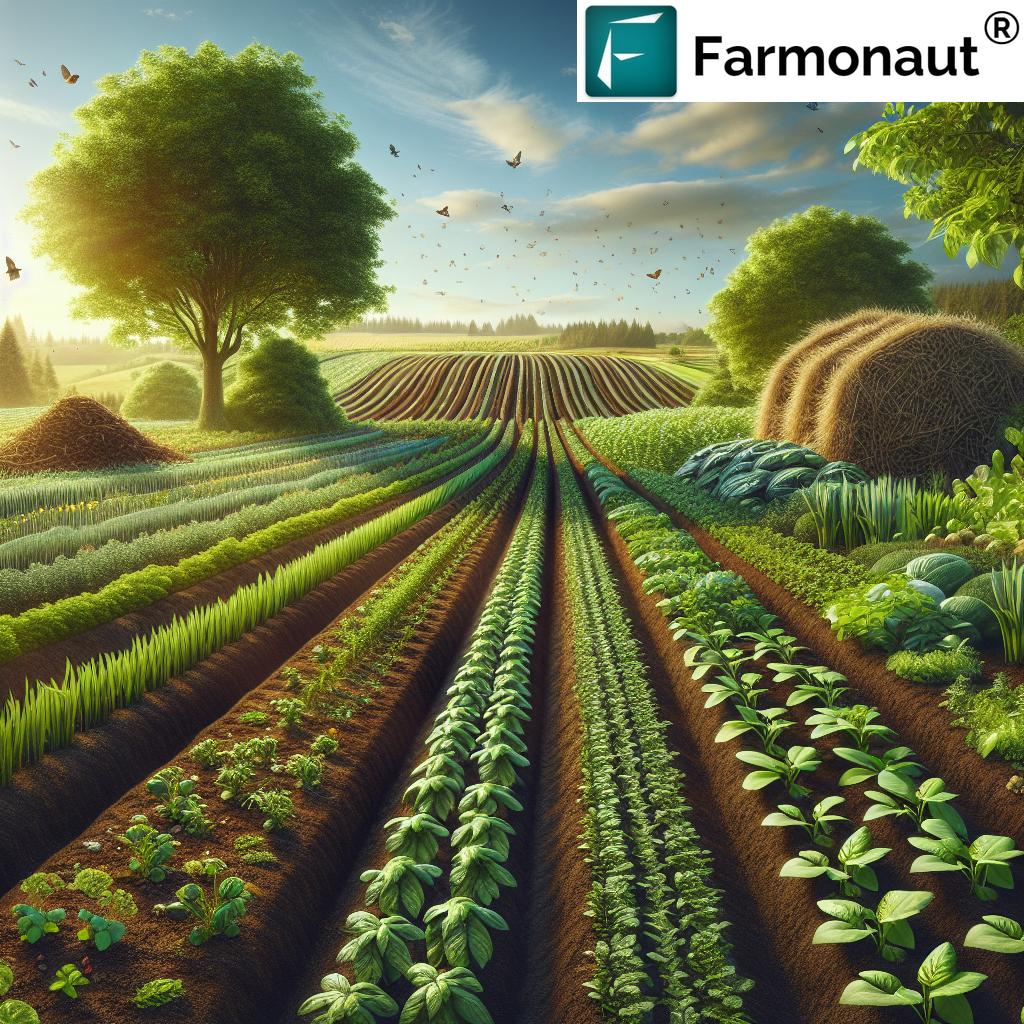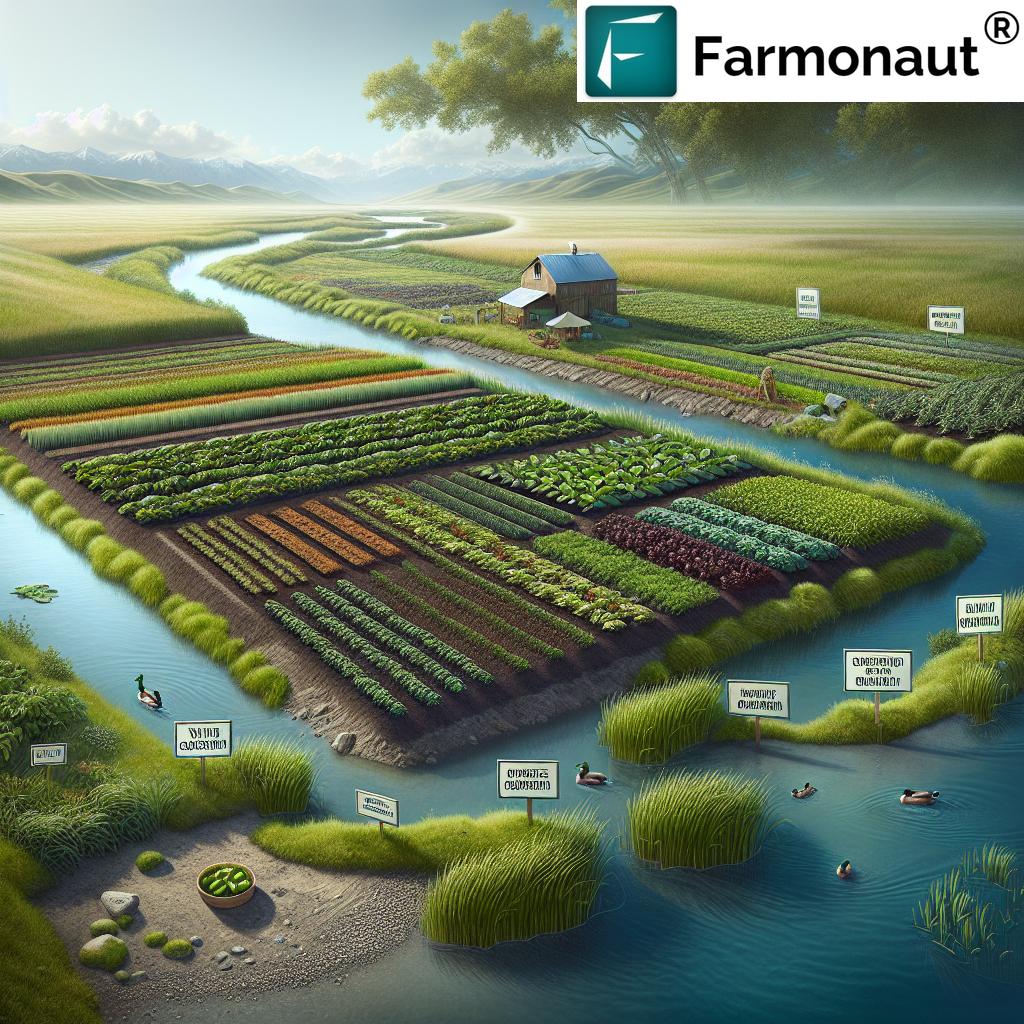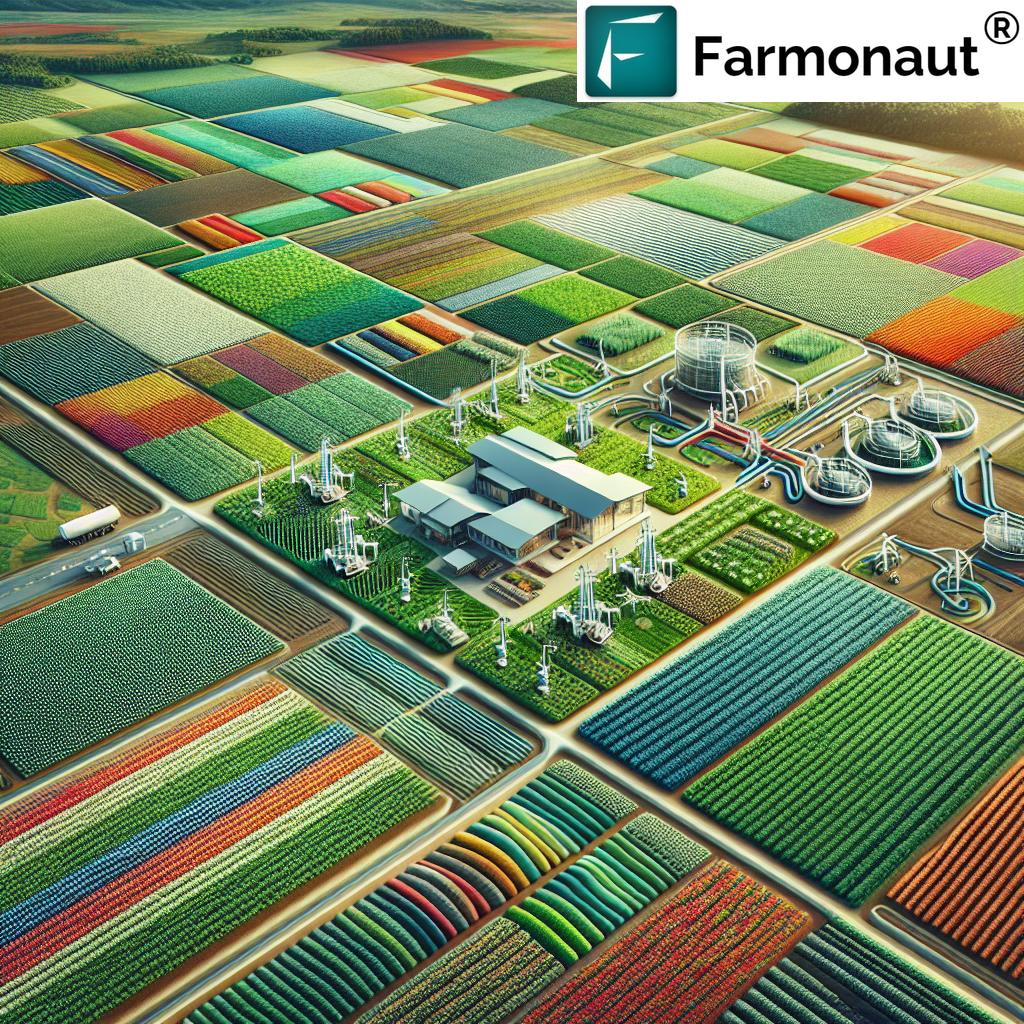Organic Farming Sustainability: 7 Shocking Eco Benefits!
“Organic farming increases soil organic matter by up to 21% compared to conventional methods.”
Table of Contents
- Introduction: Organic Farming Sustainability in the Modern Era
- What is Organic Farming? A Sustainable Approach
- Benefit Impact Table: Organic vs. Conventional Farming
- 7 Shocking Eco Benefits of Organic Farming
- How Farmonaut Empowers Organic & Sustainable Farming
- Organic Food Market Demand & Economic Viability
- Challenges in Adopting Organic Farming Practices
- Conclusion: Towards a Sustainable Food System
- Farmonaut Subscriptions
- Frequently Asked Questions
Introduction: Organic Farming Sustainability in the Modern Era
In a world witnessing rapid climate change, biodiversity loss, and resource depletion, the importance of organic farming sustainability has never been more critical. Our agricultural choices directly impact the environment, soil and water resources, ecosystem health, and the food we consume. As we collectively strive for a sustainable food future, understanding the environmental benefits of organic farming is essential—not just for farmers, but for all stakeholders involved in the food system.
In this blog, we’ll demystify organic agriculture, delve into seven shocking eco benefits of this sustainable approach, and explore how technological innovations—including solutions from Farmonaut—are driving the next wave of agricultural transformation.
“Organic farms support up to 50% more plant, insect, and bird species than non-organic farms.”
What is Organic Farming? A Sustainable Approach
Organic farming is a holistic agricultural approach aimed at cultivating food while preserving the long-term health of soil, water, ecosystems, and communities. Rather than relying on synthetic fertilizers, pesticides, or genetically modified organisms (GMOs), organic agriculture employs natural processes—such as composting, crop rotation, cover cropping, and green manuring—to enhance soil fertility, control pests, and promote biodiversity.
- No synthetic chemicals: Organic farms exclude synthetic fertilizers and pesticides to minimize residue risks and reduce pollution.
- Genetically modified organisms (GMOs): Not permitted in organic agriculture to maintain ecological balance.
- Supporting natural systems: Organic methods prioritize ecosystem health, soil biology, and resource conservation.
- Biodiversity: Multiple crops, natural habitats, and fewer monocultures create more diverse farm systems.
- Food quality: Organic products are valued for their safety, integrity, and transparency.
By avoiding synthetic inputs and focusing on the synergy between soil, organisms, crops, and the environment, this sustainable farming method serves as a cornerstone for responsible agricultural development.
Benefit Impact Table: Organic vs Conventional Farming
The environmental benefits of organic farming become clearer when key sustainability metrics are compared side by side with conventional farming. The table below illustrates how organic practices outperform conventional ones in aspects crucial to sustainability and ecological balance.
| Eco Benefit | Organic Farming Impact (Estimated Value/Improvement) | Conventional Farming Impact (Estimated Value) | Environmental Relevance |
|---|---|---|---|
| Soil Fertility | 20% higher organic matter; improved soil structure; increased earthworm activity | Declining organic matter; compacted soils; reduced soil biota | Vital for long-term productivity, erosion prevention |
| Biodiversity | Up to 50% more plant, insect, and bird species | Lower biodiversity; higher monoculture rates | Enhances ecosystem resilience, pest control, pollination |
| Water Conservation | 15–20% more water retention; reduced runoff and waterway pollution | Lower water retention; increased runoff and contamination | Prevents drought stress, conserves freshwater resources |
| Carbon Sequestration | Up to 25% increased soil carbon storage | Minimal carbon sequestration | Mitigates climate change, boosts soil health |
| Reduced Chemical Usage | Eliminates synthetic fertilizers/pesticides; natural pest control | High chemical dependency; residue risks | Protects human & animal health, soil and water quality |
| Pollinator Support | Up to 30% higher pollinator abundance and diversity | Lower pollinator survival due to pesticides | Ensures crop pollination, ecosystem function |
| Climate Resilience | Greater drought/flood resistance; healthier agroecosystems | Higher vulnerability to weather shocks | Secures food security in changing climates |
7 Shocking Eco Benefits of Organic Farming
Let’s explore the seven most transformative environmental and ecological benefits of organic farming sustainability. Each benefit is backed by scientific principles, field results, and global best practices, making the case for scaling up sustainable farming methods worldwide.
1. Enhanced Soil Fertility and Structure
Perhaps the most fundamental focus of organic agriculture practices is soil fertility improvement. Healthy, living soil is the root of sustainable food production and ecosystem stability.
- Organic matter boost: Practices like composting, green manuring, and returning crop residues to the field increase soil organic carbon content by up to 21%. This spike in organic matter improves water retention, nutrient availability, and soil aeration.
- Microbial diversity: By avoiding synthetic chemicals and encouraging plant diversity, organic systems support a richer community of soil organisms—earthworms, mycorrhizal fungi, and beneficial microbes.
- Reduced erosion: Dense root systems of cover crops and crop rotations stabilize the soil, significantly reducing erosion compared to conventional farming.
- Long-term productivity: Higher fertility means sustained yields and less soil degradation over time.
Soil health underpins carbon sequestration in agriculture and builds climate resilient farms.
2. Biodiversity Boom in Organic Farms
Biodiversity in organic farms is one of the most eye-opening advantages of this agricultural model. Organic fields tend to host a much greater variety of plant, insect, and bird species, helping to maintain ecosystem balance and resilience.
- Diverse crops and habitats: Crop rotation, mixed cropping, hedgerows, and uncultivated zones provide habitats for a broad range of beneficial species.
- Natural pest control: A vibrant population of beneficial insects (like ladybugs and predatory beetles) and birds helps keep crop-damaging pests in check, minimizing reliance on external interventions.
- Pollinator health: Bees and butterflies thrive in organic landscapes, vital for effective pollination and lifecycle balance.
- Ecosystem resilience: Greater species diversity means ecosystems can recover and adapt better to shocks (like infestations or droughts).
In fact, organic farms can support up to 50% more species diversity compared to farms reliant on monoculture and pesticides.
3. Water Conservation & Improved Water Quality
Water conservation in agriculture is critical as freshwater becomes scarcer worldwide. Organic farming methods are proven to enhance the soil’s ability to absorb and retain water—reducing irrigation requirements, minimizing runoff, and protecting water quality.
- Improved soil structure: Thanks to increased organic content, organically managed soils hold 15–20% more water, vital for both drought-prone and rainfed systems.
- Reduced waterway pollution: By skipping synthetic fertilizers and chemical pesticides, the risk of nitrate and pesticide runoff is dramatically reduced, shielding rivers, lakes, and groundwater from contamination.
- Mulching & cover crops: Help shade the soil, decrease evaporation, and prevent erosion.
Healthier water ecosystems mean improved aquatic biodiversity, safer drinking water, and a more sustainable agricultural base.
4. Carbon Sequestration & Reduced Greenhouse Gases
With the world united in action against climate change, carbon sequestration in agriculture has risen to the forefront. Organic farming sustainability outpaces conventional systems in storing carbon and lowering emissions.
- Soil organic carbon: Organic methods boost carbon stocks by up to 25%, drawing carbon dioxide from the atmosphere into stable soil compounds.
- Lower greenhouse gas emissions: From production to field application, synthetic fertilizers and pesticides are energy-hungry and release potent emissions. By eliminating them, organic farms consume less energy and emit fewer greenhouse gases.
- No-till or reduced tillage: Protects soil structure and stores more carbon below ground.
This eco benefit directly supports global climate targets and improves long-term agroecosystem vitality.
Tracking and improving your farm’s carbon footprint is now easier than ever. Discover more about Farmonaut’s Carbon Footprinting solutions—empowering farmers to reduce emissions and enhance sustainability.
5. Reduced Chemical and Pesticide Pollution
The widespread use of synthetic chemicals in conventional agriculture has raised alarms about ecological and health impacts. Organic farming, by design, eliminates these risks.
- No synthetic fertilizers or pesticides: Organic farms use natural alternatives—like compost teas, neem oil, or biological pest control agents—to manage fertility and pest pressure.
- Reduced pollution and runoff: Elimination of aggressor chemicals means fewer residues in soil, water, wildlife, and food crops.
- Soil and water quality protection: Cleaner farming means safer groundwater and healthier communities.
The reduced toxicity level of organic food products is a significant draw for environmentally aware consumers.
6. Pollinator and Wildlife Support
Pollinators—like bees and butterflies—are essential for healthy crops, biodiversity, and food security. Organic systems provide unmatched support for these vulnerable creatures.
- Biodiversity in field margins: Flower-rich field boundaries and meadows offer vital habitats for pollinators and birds.
- Avoidance of harmful chemicals: Organic agriculture does not use neonicotinoid pesticides and other substances proven to harm bees and beneficial insects directly.
- Bird and insect-friendly landscapes: Abundant food sources and nesting opportunities multiply wildlife presence on organic farms.
Robust pollinator populations not only sustain crop yields but also safeguard broader ecosystem functions.
7. Climate Resilience in Organic Systems
As the frequency and severity of climate extremes rise, building climate resilience into agricultural systems is crucial. Organic farms demonstrate higher resilience than their conventional counterparts.
- Soil moisture retention: Organically managed soils resist both drought and heavy rainfall damage thanks to better water infiltration and storage.
- Genetic/crop diversity: By cultivating multiple crops and varieties, organic farms are less likely to suffer total yield loss from extreme weather events.
- Ecosystem buffer effect: Diverse habitats mitigate pest outbreaks and disease spread.
These climate-smart practices support food security and economic stability in a changing world.
How Farmonaut Empowers Organic & Sustainable Farming
While adopting organic farming sustainability principles is crucial, the next frontier lies with precision agriculture—technology designed to optimize every resource and maximize benefits. Farmonaut stands as a global leader in providing these cutting-edge solutions to farmers, agribusinesses, and institutions.
- Satellite-Based Crop Monitoring: With Farmonaut, farmers gain real-time insights into crop health, detect diseases early, and monitor soil moisture. This empowers organic farmers to further optimize input use and safeguard long-term soil fertility.
- AI-Powered Advisory—Jeevn: Get customized, real-time crop management tips—integrating weather forecasts, pest detection, and soil health analytics to continuously improve organic yields.
- Blockchain Product Traceability: Farmonaut’s Traceability solutions assure both producers and consumers about product origins, building trust in the organic food supply chain while reducing fraud.
- Carbon Footprinting Tools: Instantly track and report farm-level carbon emissions with Farmonaut’s intuitive dashboards, aligning with global sustainability goals.
- Resource and Fleet Management: Large organic farms and agribusinesses can optimize fleets, operational efficiency, and resource allocation via Fleet Management and Large Scale Farm Management features.
- Crop Loan & Insurance: Farmonaut’s crop verification harnesses satellite insights to enable transparent, fraud-resistant insurance and financing for organic farm transitions.
- APIs for Developers: Integrate farm-level data into your own agriculture solution with Farmonaut’s API and access detailed developer docs here.
All these technologies are accessible on Android, iOS, and web—putting affordable, data-driven sustainability at every organic farmer’s fingertips.
Organic Food Market Demand & Economic Viability
The organic food market demand continues to surge as consumers worldwide associate organic labels with better health, environmental ethics, and food quality. However, the economics of organic farming involve important nuances:
- Potentially reduced yields: Especially during transition years, organic yields can be lower (by an average of 20%) than high-input conventional systems. Over time, however, soil fertility and farm resilience tend to improve.
- Premium pricing: Organic products command higher prices in global markets, offsetting yield gaps and driving profitability.
- Lower input costs: Fewer expensive synthetic chemicals needed.
- Certification costs: Compliance and paperwork can be barriers for some farmers.
With platforms like Farmonaut, farmers can access satellite-based verification—making it easier to document sustainability and comply with organic certification requirements.
Challenges in Adopting Organic Farming Practices
While the ecological benefits of organic farming are substantial, making the transition is not without hurdles:
- Knowledge and skills: Farmers must learn to manage pests, nutrients, and crop rotations without synthetic tools.
- Transitional yield losses: Farms may experience a dip in productivity before ecosystems adjust and recover.
- Pest and disease pressure: Requires careful planning and vigilance since synthetic solutions are off-limits.
- Certification and documentation: The process may be time-consuming and costly, but technology—like farm management and traceability platforms—helps.
Despite these challenges, the health, environmental, and long-term productivity advantages make organic agriculture a powerful avenue for sustainable food systems globally.
Conclusion: Towards a Sustainable Food System
Organic farming, by prioritizing natural processes, biodiversity, and resource conservation, offers a proven path toward agricultural sustainability. While challenges exist, advances in digital agriculture—like those provided by Farmonaut—make these methods more practical, profitable, and scalable than ever before.
As we collectively face environmental degradation, food system vulnerabilities, and shifting consumer demand, organic farming’s eco benefits—improved soil health, clean water, thriving biodiversity, carbon storage, reduced pollution, pollinator support, and climate resilience—are more critical than ever. By combining time-tested practices with modern precision technology, we can protect our planet, feed our communities, and build resilient ecosystems for generations to come.
Farmonaut Subscriptions
Explore Farmonaut’s flexible, cost-effective subscription plans for satellite-based farm management, analytics, and sustainability tracking. Suitable for organic, conventional, and mixed-farming operations worldwide.
Frequently Asked Questions (FAQ): Organic Farming Sustainability
What is organic farming and how is it different from conventional farming?
Organic farming is an agricultural approach that avoids synthetic fertilizers, pesticides, and GMOs, relying instead on natural processes (like composting and crop rotation) to enhance soil fertility and manage pests. Conventional farming, in contrast, uses synthetic inputs and is often more resource- and energy-intensive, with higher risks of environmental pollution.
How does organic farming support soil health?
Organic farming increases soil organic matter, improves structure, promotes microbial diversity, and prioritizes soil conservation. Practices like green manuring and composting not only boost fertility but also reduce erosion and enhance resilience.
Why is biodiversity higher in organic farms?
Biodiversity in organic farms results from diverse crops, hedgerows, and natural habitats which support beneficial insects, birds, and wildlife. The absence of synthetic chemicals also helps protect sensitive species.
How does organic farming help address climate change?
Organic agriculture supports carbon sequestration in agriculture by increasing soil carbon stocks, reducing greenhouse gas emissions, and minimizing energy use through the elimination of synthetic fertilizers and pesticides.
Can Farmonaut technology help organic farmers?
Absolutely! Farmonaut empowers organic farmers with satellite-based monitoring, AI-advisory systems, carbon footprinting, traceability, fleet/resource management, and more—helping optimize productivity, document sustainability, and reduce costs.
Is organic farming economically viable?
While yields can be lower, organic products fetch higher prices due to consumer demand. Organic farmers save on chemical inputs and can utilize digital tools for certification, traceability, and insurance, improving their long-term profitability and risk management.
Where can I try Farmonaut’s services?
Farmonaut is available as a web app, Android app, and iOS app. Try Farmonaut today and experience the future of sustainable agriculture firsthand!










